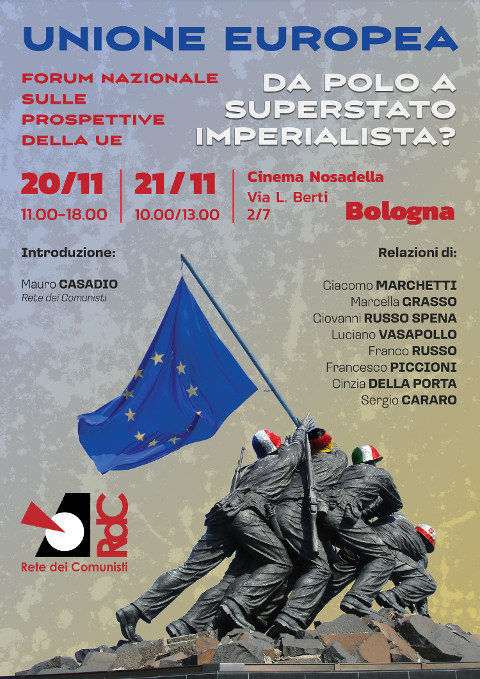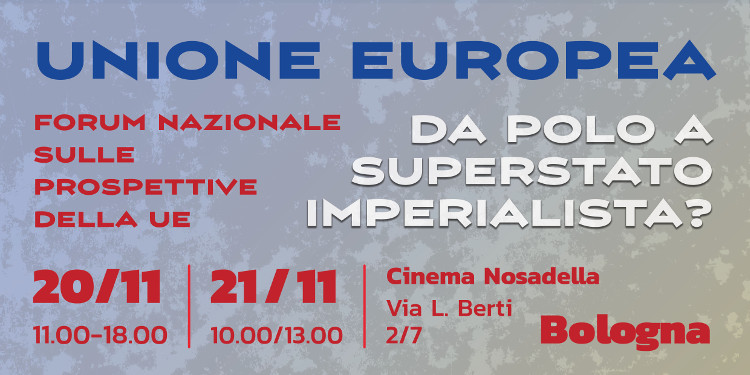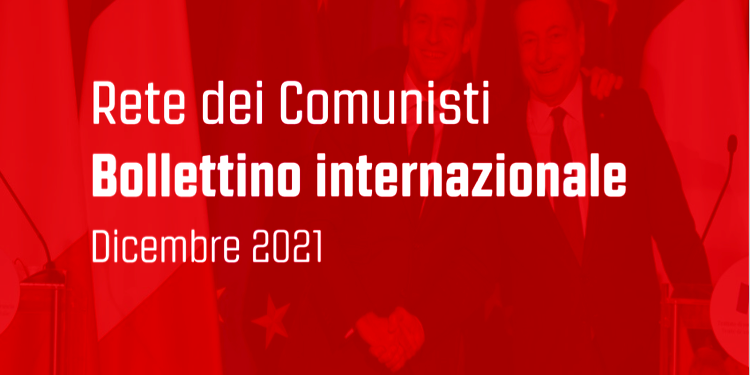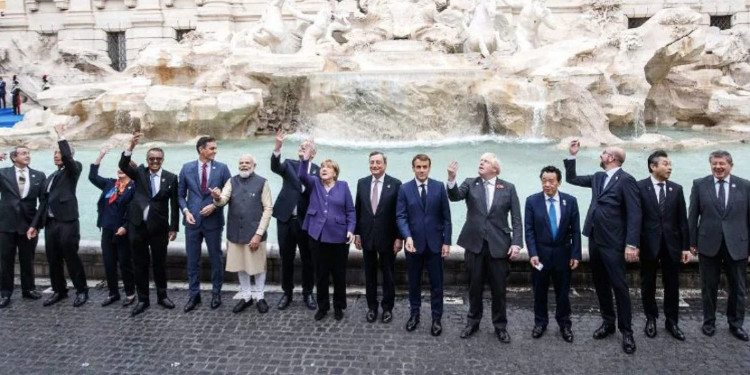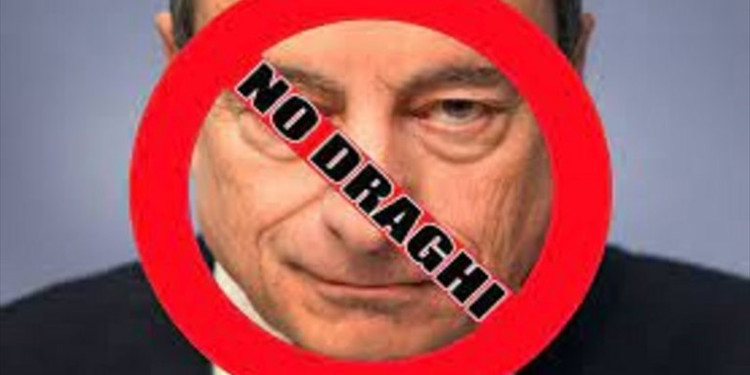| english | español | français | italiano
National Forum of the Rete dei Comunisti on the perspectives of the EU
Rete dei Comunisti
Saturday 20.11 and Sunday 21.11, at the Cinema Nosadella, Bologna
The decline of the USA, the start of the restructuring of continental industry and the European army are the conditions for a qualitative leap in the EU’s international role.
In Von Der Leyen’s report on the state of the Union, one peremptory statement stands out more than any other, and it is the one that states: “We are entering a new era characterised by hyper-competitiveness”. This statement is based on many elements that had already been present in previous years but which, as far as the EU is concerned, now have an objective need for a political, institutional and military synthesis.
This need began to take shape with the pandemic, which highlighted how relations within the EU had to be modified in the sense of a closer decision-making and operational centralisation.
The Recovery Fund is precisely the realisation of this need, which primarily concerns international economic and financial competitiveness
It directs European companies, especially the so-called “champions”, i.e. continental multinationals, towards a high-level technological and pseudo-environmental restructuring in order to keep up with the competition from China but also from the USA, which is now in obvious difficulty.
Not only that, but the size of the European bonds integrated with those issued by the Next Generation EU give the EU the chance to compete with the euro also in terms of world reserve currencies, eroding, together with the Chinese yuan, the position of the dollar, which has been going on since the end of the Second World War with the Bretton Woods agreements.
But the main fact that is forcing the Eurocrats and the economic and financial forces in the EU to move forward quickly on integration is the crisis of US hegemony, which is now apparent to the whole world. The flight from Afghanistan, having done so without “warning” its NATO allies and, lastly, the Auskus strategic agreement with the United Kingdom and Australia in an anti-Chinese function, demonstrate the total failure of the US strategy born after the collapse of the USSR.
The abandonment of the Asian continent, the weak and defensive attempt to reconstitute a “pelagic” alliance without the EU countries and the affront to France over the submarines sold to Australia obliges the European Union to relaunch its role, which can only be strategic. First and foremost, it must take note of the downsizing of the United States as a unipolar world force and the start of an unprecedented multipolar phase in which every state actor is alone in the aforementioned hypercompetition.
The discontinuity created by the unipolar phase of US hegemony inevitably leads to the formation of a European army, which is already present in the plans and public statements of the EU government
Such a level of global competition implies for the EU the need for decision-making centralisation and recompacting within its own community sphere but also aimed at its first external periphery, North Africa, West Africa and the Middle East, which immediately leads to the need for a real restructuring of both a productive and social nature.
For our country, the parallel can only be made with the industrial restructuring of the 1980s, which scientifically aimed at destroying the working class that in the 1970s was the vanguard of the struggles in Italian society, calling into question the redistribution of national wealth, which until then had been entirely to the advantage of the ruling classes.
This reference can give us an idea of what is maturing and how, under the rhetoric of environmentalism, alternative energies, and modernity produced by European civilisation, a period of profound modification of production, public services, and social conditions is in the offing, with tears and blood being shed by the subordinate classes, starting with the so-called middle classes, which are today in a clear vertical crisis.
It is equally clear that the process of generalised centralisation will penalise democracy in individual countries, as is being demonstrated by Draghi’s decision-making, which is far more aggressive and dangerous than that of Craxi in the 1980s.
In perspective, the downsizing of the industrial apparatus, redundancies, job insecurity, the folding of public resources to the advantage of companies, and the wearing out of the residual democratic spaces will be the features of a long phase that will see an overall deterioration of European societies, and this in an international context where economic competition could overflow into political and military clashes with as yet unpredictable sides.
SOCIAL EFFECTS OF RESTRUCTURING
As the Rete dei Comunisti, since the 1990s we have identified this historical trend and described it as the construction of a “European Imperialist Pole” in a post-Soviet division of the world that saw the emergence of competitive economic and monetary areas around the USA, first with NAFTA and then with the failed attempt of the FTAA for Latin America, and around Japan, recognising in that trend the dangers of a resumption of world conflict. At the time, we said that the duty of anti-imperialists and communists was to fight against their own imperialism, which for us meant opposing and breaking up the EU that was being formed.
A lot has changed since that decade, with the emergence of China as a world economic power, the multiplication of regional forces such as Iran, Russia and Turkey, the end of Japan’s imperialist ambitions and now also the hegemonic crisis of the USA. The only organic project that has gone ahead thanks to the multiple crises, which have acted as a driving force for the integration project, has been the construction of the European Union. Today, the European Union is on its way to overcoming the condition of “Economic and Financial Area/Pole” and becoming an imperialist superstate that competes on the world stage like the other powers.
In this paradoxical international discontinuity and continuity of the EU, we believe it is essential to reconfirm the objective of breaking up the European Union, Italy’s exit from the EU and NATO, and the construction of an alternative area that we see in what we have called the Euro-Mediterranean Dawn
POLITICAL PROPOSAL
We are well aware that this is not an objective on the agenda, but we know that the next few years, the next historical phase, will be characterised by an increase in conflicts, from the class conflict within the EU to the international conflict, which is certainly political if not directly military.
Therefore, giving a marching directive, clearly indicating who the enemy is, not leaving the coming conflicts politically and ideologically unarmed, is a commitment that must start from the present moment of crisis of our class adversary, on pain of the affirmation of reactionary movements that we always realise too late, despite the fact that for years we have been crying wolf, often in the wrong direction.
